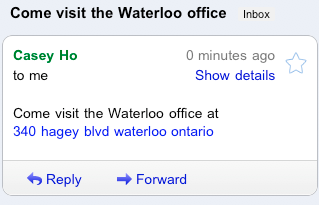We're Listening
iGoogle for Android and iPhone
In January, the high-end version of iGoogle for Android was discontinued because we felt it was too slow, and users were, instead, redirected to the standard Mobile iGoogle site. At the time, we thought you'd welcome the improvements to speed and stability. We humbly found out that we were wrong. One thread in the user forum received over 350 replies and almost 18,000 page views! Here's what some folks had to say:
"The mobile version is not good enough. Why should I have to suffer because other mobile devices offer crappy browsers? This is a horribly short-sighted decision." - tewha
Well, we heard you loud and clear. Our team read each of the forum posts, and listened to why the standard version did not meet your needs. Last month, we brought back iGoogle for Android and iPhone and made it better than ever. The new version is faster and easier to use, and there's support for tabs and more of your favorite gadgets. We also now support the in-line display of articles for feed-based gadgets, so you can read article summaries without leaving the page.
We're glad that so many of you voiced your ideas. iGoogle is back and better, and it seems like folks are pretty stoked:
"Personally, I could have cried. And I mean that in a good way. OMG-about time!! I'm leaving on vacation and was for sure I was going to have to take my laptop. Tabs actually work! My gadgets work! Its back! Hip Hip Hooray!" - ktigger2
Google Maps for mobile
Soon after we launched Google Maps for mobile 3.0 and Google Latitude on four platforms (Android, BlackBerry, Windows Mobile, and Symbian S60), we received some helpful feedback on where improvements could be made and problems fixed.
Keeping in mind the input of many faithful Help Forum posters, we released two updated versions for Windows Mobile and Symbian S60 users in April (version 3.0.1) and July (version 3.2). These versions added new features, like Layers, and included some fixes and new ways to use Maps for mobile that were among the most requested by you. For example, the My Maps feature request received over 2,000 votes on our Mobile Product Ideas page. We also used specific Help Forum conversations to tweak behavior, such as the backlight timeout on Symbian phones, and to fix issues, like copy and paste for Windows Mobile phones.
In June, we also updated Maps in Android Market to Maps 3.1, introducing popular feature requests like Transit directions and Google Search by voice. We've received lots of positive feedback about pushing out these features:
"Not only is this an awesome update, but what an awesome way to distribute!" - matt
Chris Nguyen & Gabe Garcia, Google Mobile Consumer Operations

























